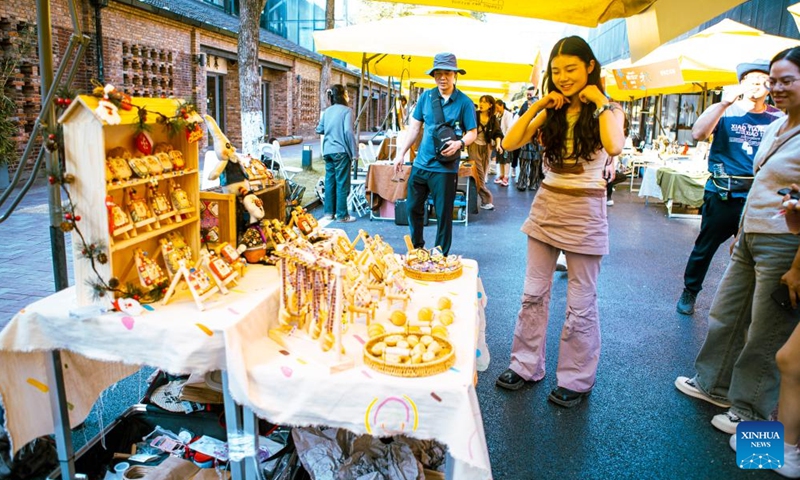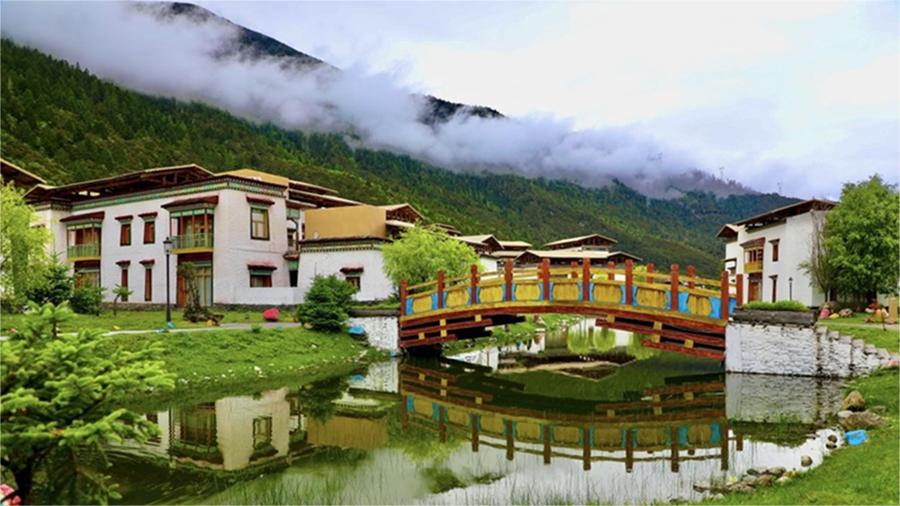Township trip trendy among desk jockeys seeking relaxation, not ‘consumption downgrade’ but new economic opportunities

People visit an open-air art fair, as part of the 2023 China Jingdezhen International Ceramic Expo, in Jingdezhen, east China's Jiangxi Province, Oct. 17, 2023. (Photo: Xinhua)
For a long time, vacations for Chinese young middle class could mean the beach on a tropical island, nature in New Zealand, or cultural exploration in Europe. If time and budget prevented this, they would travel domestically for similar experiences.
But recently, a new type of vacation has emerged among young "desk jockeys" in metropolises – visiting nearby small townships for a couple of days. The trend might be interpreted as a "consumption downgrade," but a closer look finds a hive of local businesses already capitalizing on the trend.
More than 'I was here'
A Shanghai-based office worker surnamed Meng just spent four days in nearby Quzhou, East China's Zhejiang Province, where she can sleep in luxury hotels at half the price of Shanghai, or even less. But the expense was not the reason Meng chose this small mountainous city for a short vacation.
In her 30s, Meng is tired of spending her vacations at popular destinations, posing for her "I was here" photo, lining up for "must-go" restaurants, and sharing the experience on social media with some carefully written "thoughts about my travels."
"I just want to lie down in a four- or five-star hotel room, hang out, try some local specialties, and most importantly, avoid the crowds," Meng told the Global Times.
Many young people are turning to small townships and counties near the metropolises they live and work in, as they feel those places offer true relaxation at a more reasonable price.
It might appear like a consumption downgrade at first sight, but Meng and people like her said these places are not "cheaper replicas of top travel resorts."
"In total, I actually didn't spend much less, yet the experience is better," Meng said. When accommodation is cheaper, Meng said she is more likely to spend more on special local experiences like a tea-picking tour outside Hangzhou, porcelain-making classes in Jingdezhen, and coffee courses in Baoshan, Southwest China's Yunnan Province during longer holidays.
Those experiences allow Meng to take her time rather than rushing to sightseeing spots and give her a better understanding of the nature and culture of the travel destinations.
Since she spends on average less for each trip, Meng can get away more frequently from her busy, stressful everyday life.
A hostel operator in Zhangjiakou, North China's Hebei Province, told the Global Times that in the past two years, business has improved as skiing enthusiasts come in winter while in summer, many Beijingers come to the small city for its cooler weather, escaping the "heat island" of the capital.
The operator Liu, a villager from the Yuxian county of Zhangjiakou, renovated his own house into a hostel. Many other villagers are running car rentals and other businesses related to the travel boom in this small county.
In Yuxian and other nearby counties, travelers can ride a horse on the verdant grasslands, have short excursions along the Great Wall, enjoy drifting on a raft along the river, and satisfy their appetite at the outdoor barbecue restaurants.
New opportunities
Young people's enthusiasm for more relaxing travel offers townships and small counties the opportunity to develop their unique attractions into an economic growth point. The model is being extended to more and more localities with the construction of the already dense transportation network, particularly the bullet train.
There is even a city metro line connecting Beijing and Zhangjiakou, one of the sports venues for the Beijing 2022 Winter Olympic Games.
Media reported that some metropolitan residents travel to nearby townships for equestrian or tennis courses, and the big price gap could make up for the traffic costs.
There is only one tennis club in the small town, and cars with plates of other cities, including Beijing, filled up the adjacent parking lot on weekends, tennis learner Jessica told Life Lab, an account under Life Weekly magazine.
Via convenient transportation, small townships' services found their "migratory customers" in big cities, and people with strong consumption power are injecting new development impetus into these small localities, constituting a new urbanization and economic transition model.
Observers said that many small places close to metropolises have experienced a talent drain, having an aging population and lacking economic vitality. This new model has the potential to bring that vitality back.
Photos
Related Stories
- China to facilitate accommodation for foreign travelers
- Local authorities in SW China leverage ethnic features to boost summer tourism
- Chinese tourist arrivals to Mongolia jump in H1 2024
- China revs up hospitality, boosts services to ride "China Travel" boom
- Visa-free policy to invigorate tourism cooperation between HK, Hainan: HKSAR gov't
- China sees 14.3 percent more domestic trips in H1
Copyright © 2024 People's Daily Online. All Rights Reserved.









